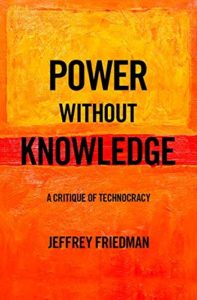
In this series of posts so far, we’ve looked at Jeffrey Friedman’s definition of technocracy, the existence of naive realism and its consequences, problems of knowledge and interpretation among citizen-technocrats, and the problem of ideational heterogeneity. Can these issues be overcome by epistocrats?
To recap, Friedman defines citizen-technocrats as those who believe identifying the existence and causes of social problems, along with cost-effective solutions, can be handled with common sense or by intuiting self-evident truths. By contrast, epistocrats believe that the requisite knowledge is counterintuitive or otherwise not self-evident but believe they, through their training and study, have gained the requisite knowledge and skill to successfully solve technocratic problems.
Here, too, Friedman is skeptical. He raises many issues with epistocrats, but here I focus on just two. One is Friedman’s idea of the spiral-of-conviction, and the other is the technocratic selection effect.

To start, Friedman thinks it’s far from clear that the greater and specialized knowledge held by epistocrats would make them effective in their role as technocrats, stating that “Mere epistemic specialization does not necessarily ensure enlightenment; it may simply ensure narrowness of focus or pedantry.” Additionally, Friedman disputes what he calls the “additive” view of knowledge – the idea that as one gains more information or more facts, one necessarily gains a more accurate understanding of the world. “In the additive view, the problem is a deficit of information that needs to be supplemented, not a surfeit of information that needs to be selectively attended to if it is to be understood.” Even epistocrats are unable to escape the problems of interpretation in the face of overwhelming social complexity:
Without the assumption that more information necessarily grants one the ability to more accurately interpret that information in a way that accurately reflects reality, “we should not assume that those who are more knowledgeable than their peers are likely to make better technocratic decisions.”
All this aside, epistocrats face a difficulty over and above the difficulties faced by citizen-technocrats – the spiral of conviction. “The spiral of conviction is the hypothesis that as people become better informed – that is, roughly speaking, as they move from being citizen-technocrats towards being epistocrats – they inadvertently become dogmatic.”
How does one become dogmatic “inadvertently”? It’s an unavoidable side effect of the need to create a coherent interpretation of the miniscule amount of information they can gather, because “one can begin to understand a topic (as opposed to memorizing facts about it) only after hearing or generating an interpretation of it that makes certain information about it legible or coherent. In this way an interpretation clarifies part of the otherwise-mysterious world, but as Lippmann understood, this clarity comes at the price of screening out interpretation-incongruent information, which tends remain illegible or to be dismissed as implausible.”
Friedman views this as different from simple confirmation bias, because that term “is often taken to mean a deliberate attempt to seek out confirmatory information. My suggestion, on the contrary, is that spirals of conviction are inadvertent and involuntary, just as are the perceptions, beliefs, interpretations, and biases that may be reinforced by a given spiral.”
Those among us who dedicate the most time to studying social issues still must make decisions about which data are worth studying. Time is the ultimate constraint, and there seems to be no sense in “wasting time and effort on unintelligible, ‘obviously’ wrong, or annoying obtuse arguments for truth-claims that are inconsistent with [the epistocrat’s] growing and increasingly persuasive web of beliefs.” Friedman emphasizes that this is a rational process, which indicates “the spiral-of-conviction model is interpretively charitable.” He notes:
However, while certain elements of the spiral of conviction are unavoidable, not everyone gets trapped to the same degree. Some people might be impacted to a lesser extent:
Unfortunately, this creates another problem – the more sophisticated a thinker is in this regard, and the less trapped they are in the interpretive bubble created by the spiral of conviction, the more likely they are to be filtered out of the pool of potential epistocrats. An epistocratic technocracy, by definition, needs epistocrats who make policy prescriptions, creating a selection pressure in favor of technocrats most willing to do so. This creates a self-selection effect among epistocrats:
This selection effect is also present in the policymakers who seek out the advice of epistocrats:
Thus, epistocracy is likely to end up in an odd variation of the Peter Principle. Lawrence Peter predicted that “In time, every post tends to be occupied by an employee who is incompetent to carry out its duties.” The Friedman Principle, by contrast, predicts that in an epistocracy, every technocratic decision will be made by the technocrat least capable of recognizing the gap between their abilities and the requirements of the task.
In the next post we turn to Friedman’s analysis of economists and the economic profession. Early in the book, he identifies economists as perhaps “our premier epistocrats” – but as you might have guessed, he doesn’t mean that as a compliment.
Kevin Corcoran is a Marine Corps veteran and a consultant in healthcare economics and analytics and holds a Bachelor of Science in Economics from George Mason University.

READER COMMENTS
Monte
Jan 25 2023 at 11:56am
Jason Brennan, one of the leading proponents of an epistocratic form of government, or noocracy, urges us onto this path toward a “city of the wise” ruled by the intelligentsia in his book, Against Democracy. But as Friedman reminds us, and with whom I agree, there is this conundrum of the “spiral of conviction” that will inevitably bring us full circle back to incompetency, against which the very gods themselves contend in vain (Schiller).
One of the first in human history to attempt this was Pythagoras and his order of the mathematikoi, who established a community in the ancient Greek colony of Kroton, which then spread throughout Magna Graecia, ultimately falling victim to…political instability. Hmmm?
Jason Brennan
Jan 25 2023 at 2:27pm
Friedman’s characterization of my work is inaccurate. He had a box he wanted to fit in so that I could serve as a foil to his view, and when I showed him that, he shrugged and put me in the box anyway. Oh well.
Monte
Jan 25 2023 at 4:13pm
Thank you, Dr. Brennan, for your response. Admittedly, I’ve not read your book, only some its reviews. Likewise, I found a couple of abstracts (below) by Dr. Paul Gunn and Piero Moraro who dispute your conclusions and question the long-term viability of a formal epistocracy. I would welcome any comments you might have in response. Respects.
Mactoul
Jan 26 2023 at 1:37am
Selection effect for epistocrats resembles the selection for thuggish leaders in a socialist polity described by Hayek.
Comments are closed.